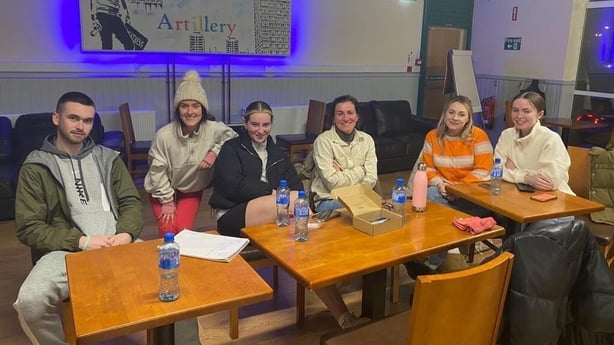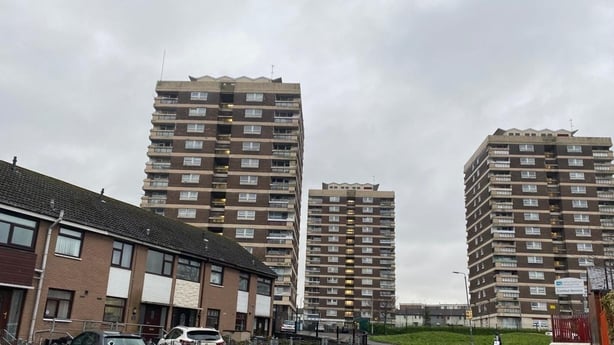"It very much feels like in Northern Ireland at the minute that we're at a tipping point, where it could go very easily back to the way it was, or we could be pushed forward in a more positive way and we're kind of just teetering at the minute," says 28-year-old Emer.
She was three years old when the Good Friday Agreement was signed – a political deal designed to end decades of violence in Northern Ireland.
Her generation was supposed to benefit from peace, social cohesion and the economic dividend that would bring. While Northern Ireland has largely enjoyed an absence of violence for the past 25 years, not all young people have felt this peace in the same way.
RTÉ News spoke with five young people at the Artillery Youth Centre in Belfast. The independent youth project is based in the New Lodge, a traditionally nationalist area, at an interface. This refers to where segregated nationalist and unionist residential areas meet, usually separated by walls and gates.

Emer, who recently had a child and is in what she calls a "mixed relationship", says she is concerned about raising her child in an unstable political climate, and in a region where segregation still exists.
"It's really, really hard being in a mixed relationship. We couldn't get a home that we could both afford and feel safe in, in Belfast."
"My partner has made the sacrifice to move into a more Catholic area, but you don't know how long you're going to be safe and it's not really our forever home."
More than 90% of social housing in Northern Ireland is still segregated, and 90% of schools are segregated. The structures of society often keep young people apart, even if they would like more interaction.
"It's drilled into you from such a young age. Part of me is still living in the past. And I shouldn't feel like that."
"Things need to move on, and people need to get over it, but I can understand, like I would still feel a bit wary about going into Protestant areas," says 28-year-old Caitríona.
Caitríona recalls when she was younger, rioting was "constant" and her ten-year-old cousins were shot with plastic bullets. She says the interface is much quieter now, with only sporadic trouble, but growing up in a segregated area has affected her in certain ways.
"If I was to walk up the Shankill [a traditionally Protestant area], I would be scared. There's absolutely no reason. Like no one has ever made me feel scared and no one has ever done anything to make me feel afraid. But it's drilled into you from such a young age. Part of me is still living in the past. And I shouldn't feel like that."
"I have loads of Protestant friends, there's no issue with anything. But for some reason it's just hard to move on."
Jamie, who is 18, says her life is completely different to her parents. "Society has come on leaps and bounds from the Troubles, and it's a whole lot safer. Anything I know about the Troubles has just been ghost stories I've heard from my daddy."
But she still thinks there is a long way to go. Stormont - the power-sharing government in Northern Ireland - collapsed again last year in a disagreement over post-Brexit trade rules, and it has left the region politically adrift.
"Obviously it would be good for there to be a bit of structure," she says. "They need to pay attention to the mental health crisis and putting money into schools and youth centres."

Jamie has also noticed the cost-of-living crisis affecting people in her community and feels leaders in Northern Ireland are not doing enough to alleviate it.
"It's difficult obviously because I am from a deprived background. My mummy and daddy have worked from when they were 16. They have never been anything but good to me. They don't want me to know if they were having money problems and stuff, but it's just really sad to see. Whenever it just shouldn't be happening."
All the young people mention the strength of community, close family ties and friendliness they experienced growing up in the New Lodge. But it is also one of the most socially deprived areas in Northern Ireland.
Piaras, 22, says there is "nowhere near enough" investment in the area and "you can see that in the streets".
"The Good Friday Agreement was taken away and was replaced by the drugs epidemic. Around here, they're walking past nurseries and there's needles and empty drug bags. And kids are growing up and seeing people injecting outside of nursery schools. Doesn't really give much hope for the kids."
Piaras says drug problems and mental health issues are intertwined, and there can still be issues with paramilitaries in the community.
"You need power-sharing here. If Stormont came back and they stopped focusing on the green and orange, then they actually could make a difference"
"Maybe not being pressured to join paramilitaries. But young people are being threatened by paramilitaries for maybe, say, anti-social elements, then paramilitaries are going and threatening and going to their door."
Piaras says his other main concern is employment. He says he was given an opportunity for employment, is thankful for it and wants to "go as far as I can go". But he feels his trajectory is the exception among his peers.
"My friend group would be 15 or 20 of us. Maybe three or four of us work. It's not good, because they weren't given a good background in school. There was no help for them, and now they’re all left to suffer."
Eighteen-year-old Cara also feels her generation is suffering from poor mental health.
"There's obviously a mental health crisis in the north, but I don't think it's been paid attention to by anyone in Stormont. Obviously you hear about people our age who are taking their own lives. It hasn't affected me, but I know people that it has."

Suicide can never be attributed to one specific factor, but Cara feels there may be several reasons why young people in Northern Ireland could be struggling.
"Social media definitely, there's so many expectations for young people now from social media. And what you saw growing up. If you have parents who have really bad trauma or whatever from the Troubles, it's going to affect you as well, like a generational thing."
Cara thinks the return of Stormont could help improve things for young people.
"You need power-sharing here. If Stormont came back and they stopped focusing on the green and orange, then they actually could make a difference."
Emer agrees that her generation has "100%" moved on from a political focus on the divisions among the nationalist and unionist population. She feels politics in Northern Ireland does not reflect the issues that matter to younger people.
"I stopped listening a long time ago. There's always kind of a green and orange wash to things. And I just got tired of listening to it."






